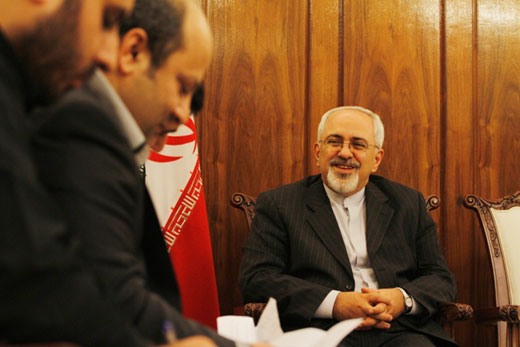Mohammad Reza Noroozpour
Iran’s Foreign Minister Mohammad JavadZarif says Tehran wants constructive interaction with the international community to safeguard and promote the rights of the government.
In an interview with Khabaronline news agency, Zarif, saying putting logical interaction with the world should be on top of Iran’s foreign policy agenda, not only focusing on Africa, Latin America and some eastern countries.
“All countries need to have relations with their neighboring states for national security, but this does not mean that they have to forget the rest of the world. There should be a sort of interaction with the influential countries butit cannot be chosen. This means the time for intentional isolation is over, the countries could decide to be isolated before, but the decision cannot be made at the moment,” Zarif said.
“Even though there is such isolationist leaning in the United States, making them believe that the country is an independent island, the 9/11 incident very well showed that insecurity in a small country in the world could threaten the security in the most powerful country. Therefore intentional isolation does not exist anymore,” he added.
The Iranian Foreign Minister stressed that if a country intends isolation, it will remove itself from the international arena and lose its interests, noting there is a need to play a role in the world and not just in the region.
Being asked about Tehran’s relations with Washington, Zarif stated that Iran “has interactions with the US every day. We adopt a stance on Washington’s policy over Syria, we have our own viewpoint regarding the US policy in the Middle East. In nuclear energy program, when we have negotiations with the P5+1 [group of world powers], in fact the main side of the talks is the United States. Therefore we have interactions with different countries, and that this interaction could sometimes be a close one and some other times with tense ties.”
Zarif also said if Tehran feels that the US is ready to establish relations with Iran based on “mutual respect, common interests and equal stance,” Tehran will hold discussion with them over controlling the differences between the two sides.
Meanwhile, Iran’s President Hassan Rouhaniofficially assigned the Foreign Ministry to take charge of future nuclear talks with the P5+1 groupearlier in September. The negotiations were previously conducted by Iran’s Supreme National Security Council (SNSC).
New round of talks is expected to begin between Tehran and the P5+1 group - comprising five permanent members of the UN Security Council plus Germany about Iran’s nuclear energy program.
Zarif noted that the Foreign Ministry should introduce the true and peaceful face of the country’s nuclear energy program, emphasizing onthe importance of advancing Iran’s goals without retreating from the rights of the nation.
“Our logical goal in nuclear energy program is the peaceful use of all aspects of the nuclear energy such as enrichment. Their [P5+1 group] logical goal should be making sure that Iran will not use the program for military purposes. I think the two goals are not contradictory and are in one direction,” he added.
Being asked whether Oman’s ruler Sultan Qaboos bin Said Al Said carried a message of war on Syria in his visit to Tehran,Zarif said Omani ruler did not have any special message for Iran.
“Sultan Qaboos, just like the leaders of many other countries, talked to us about his opinions on the US view points, as we do not have direct relations with Washington. He would also convey our view points to other side, but we did not receive any war message,” he said.
Sultan Qaboos arrived in Tehran on August 25 for a three-day visit as the first head of state to visit Iran since Rouhani took office on August 4, 2013.He held talks with Leader of the Islamic Revolution Ayatollah Seyyed Ali Khamenei and President Hassan Rouhani.
Regarding the recent war rhetoric on Syria adopted by the US, the UK and France, Zarif reiterated Iran’s constant call for political dialogue in Syria, saying the military intervention is not a solution to the crisis and that all efforts should be taken to prevent the potential war in the Arab country.


